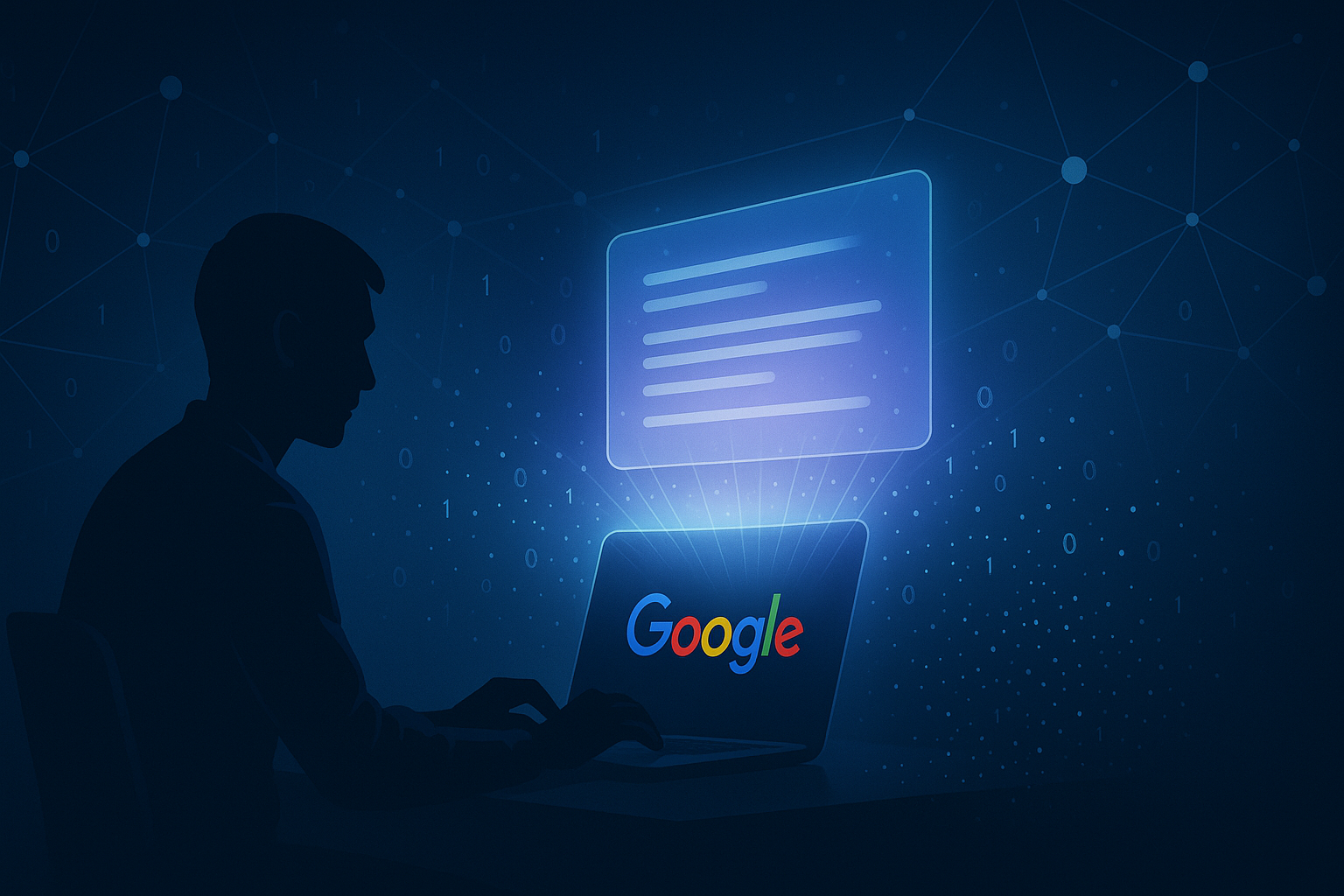
The Google search becomes the answer machine: What this means for you & the web-Image: Xpert.digital
The fundamental change: reply machines instead of web search - end with links? Zero-Click alarm with AI search engines
Directan words instead of link lists: This is how AI changes your search behavior (and what Google plans)
For over two decades, classic search engines such as Google have dominated the way we are looking for information on the Internet. But we are in the middle of a fundamental paradigm shift: AI-supported answer machines are in the process of revolutionizing traditional right-hand hunt. These systems provide direct, comprehensive answers instead of only referring to relevant websites. The transformation of searches to reply machines not only changes user behavior, but also has far-reaching consequences for the entire web ecosystem.
Suitable for:
- Semantic search engine vs. AI search: market shares in a sink flight | Google's dominance crumbles | The alternative booms
Development: From the link list to direct answer
The basic idea behind reply machines such as perplexity AI is simple, but at the same time revolutionary: instead of entering search terms and receiving a list of links, users can ask questions in natural language and receive direct answers. This development marks a significant progress in the way we interact with the Internet.
The beginnings of change
Google has been developing from a pure search engine to a answer machine for years. With features such as Knowledge Panels (2012), Featured Snippets (2014) and Quick Answers (2014), the search engine giant increasingly tried to answer user questions directly on the search result page. This was the beginning of a trend that received an enormous thrust with the advancement of advanced AI models.
The AI-driven breakthrough
The actual breakthrough came with the development of powerful Large Language Models (LLMS). In 2017, technological progress was achieved with transformer models that were able to search large amounts of data on a semantic basis quickly and efficiently. This technology made it possible not only to search content for keywords, but to actually understand the semantic meaning and to generate contextual answers.
How AI response machines work
AI search engines mainly rely on two progressive technologies: Natural Language Processing (NLP) and Machine Learning (ML), which enable a completely new way of information processing.
Natural Language Processing
NLP allows search engines to understand complex search queries in natural language. Users no longer have to reduce their questions to simple keywords, but can formulate directly and naturally. For example, a AI search engine can increase a complex question of how "How can I increase the presence of my brand in content generated by AI search engines?" Answer in detail, while classic systems often provide insufficient results here.
Machine learning
Machine Learning ensures that AI search engines learn continuously from user behavior and automatically optimize their results. As a result, these systems provide context -related and individually adapted answers in real time, based on the entire diversity of the Internet. The search results are becoming increasingly multimodal by expanding visual and auditory content.
Two main rates of the AI search
Two main rates for AI-supported search engines have developed:
- LLM with web search: Systems such as perplexity or chatt with web search get current information from the Internet and process you into a summary answer.
- Search engines with AI summary: Google tests with Gemini AI-generated short versions that are integrated directly into the search results. These so -called “AI Overviews” should shorten the search process and make it more efficient.
Leading AI response machines at a glance
Perplexity Ai
Perplexity combines a search engine based on Google's model with a chat interface à la Chatgpt. The user can ask a question in natural language and receives a specific answer in text form with linked sources. In dialogue, the knowledge you want can be developed without having to click through numerous websites.
Chatgpt with web search
Openai has expanded Chatgpt with a search function that enables direct searches on the Internet. The results are completely ad -free and very reduced, with meaningful summaries that are generated via the voice model.
Google SGE (Search Generative Experience)
Google reacts to the competition with its “Search Generative Experience” (SGE), which has been active in the USA since 2024 as “AI Overviews”. These AI generated summaries appear above the organic search results and are increasingly integrating videos and pictures. SGE introduces three important new elements: AI Snapshot, conversational fashion and vertical experience.
Microsoft Copilot and Bing
Microsoft has massively changed his search engine Bing and gives AI-generated results prominent space. The new “generative bing search” shows AI-generated results on the left, while the traditional search results are placed in a narrower column on the right.
Zero-Click searches: The changed user behavior
One of the most important effects of reply machines is the increase in the so-called “zero-click searches” search queries in which users no longer visit external websites.
Suitable for:
- Zero-Click Search, in which users can find their information directly without clicking on a website-marketing challenge
Alarming statistics
Current studies show that only every third search leads to clicks on websites. In the USA, almost 60% of mobile and desktop searches end without a click on a search result. Even more worrying: Almost 30% of all clicks go on platforms that Google itself, such as YouTube or Google Maps.
The AI reinforcement of the trend
The introduction of AI response machines significantly increases this trend. A UX study for the use of Google's “AI Overviews” shows that they drastically reduce the number of outgoing clicks-on the desktop, the click-through rate drops to external websites by two thirds, on mobile devices by almost half.
User trust and demographic differences
Young users in particular and those with high digital affinity are more likely to trust the AI. Users between the ages of 25 and 34 accept AI answers in half of all search queries as final information. Mobile users scroll deeper (54 percent) than desktop users (29 percent), while older users continue to prefer classic blue links.
Consequences for website operators and publishers
The change to reply machines has far-reaching consequences for the entire web ecosystem, especially for website operators and publishers.
Traffic loss and dependency
Through zero-click search, websites lose massive traffic. The changed search landscape leads to an even stronger concentration of power among platform operators such as Google and Meta, and Apple, in perspective. Publishers are particularly affected, the business model of which depends on people calling up their website directly.
New metrics for success
In the context of this development, new success indicators must be developed. The study on Google's Ai Overviews recommends measuring visibility instead of clicks. It becomes crucial how often and how prominently a brand appears in AI-generated answers. Metrics such as citation or “Share of Voice” become more important than classic positions in the ranking.
Differentiated effects depending on the industry
The effects of AI response machines vary depending on the industry and topic. In the case of searches with personal risk-such as health or finance-users show significantly more skepticism compared to AI-generated answers and scrolls deeper or are looking for additional sources. In the case of simple questions or definitions, however, AI answers are more often accepted without further research.
Suitable for:
The future prospects: strategies in a new search world
Despite all the challenges, the change from search to reply machines also offers opportunities. However, website operators and content manufacturers have to adapt their strategies.
From SEO to Geo (generative engine optimization)
The optimization for AI response machines could develop into a new discipline that goes beyond classic SEO. This is no longer just about giving up well in search results, but being quoted in AI-generated answers as a trustworthy source.
Focus on quality and trustworthiness
The UX study on Google Ai Overviews shows that users first check when selecting the source whether a source is trustworthy-only afterwards whether the information fits the search intention. In 58 percent of cases with well-known brands or .gov/.edu domains, these were first clicked. Establishment as a trustworthy brand is therefore even more important.
Multimodal content gain in importance
When it comes to DIY questions, many users deliberately skip AI-generated answers to see videos with practical demonstrations instead. The average length of stay in videos (37 s) exceeds that for AI answers (31 s). This underlines the increasing importance of multimedia content.
A new era of information acquisition
The change from searches to reply machines marks a fundamental upheaval in the way we search for information on the Internet and consume it. While this development promises faster and more direct answers to users, it presents website operators and content manufacturers with new challenges.
The future of the web search will be shaped by a balance between the efficiency of AI-generated answers and the need for trustworthy, deeper information. The competition between the big actors such as Google, Microsoft and Openaai will continue to promote this development.
For website operators and content manufacturers, this means a rethink in their strategies: away from pure optimization for search engine rankings towards establishing as a trustworthy source for AI systems. Quality, trustworthiness and multimodal content will be decisive factors in this new era of digital information acquisition.
Suitable for:
Your global marketing and business development partner
☑️ Our business language is English or German
☑️ NEW: Correspondence in your national language!
I would be happy to serve you and my team as a personal advisor.
You can contact me by filling out the contact form or simply call me on +49 89 89 674 804 (Munich) . My email address is: wolfenstein ∂ xpert.digital
I'm looking forward to our joint project.

